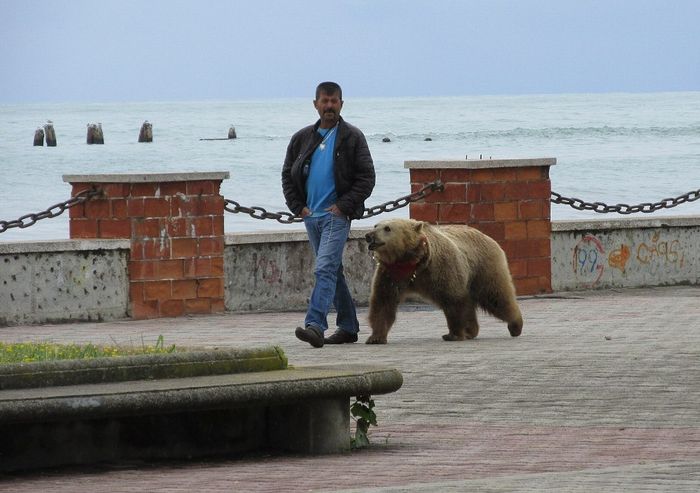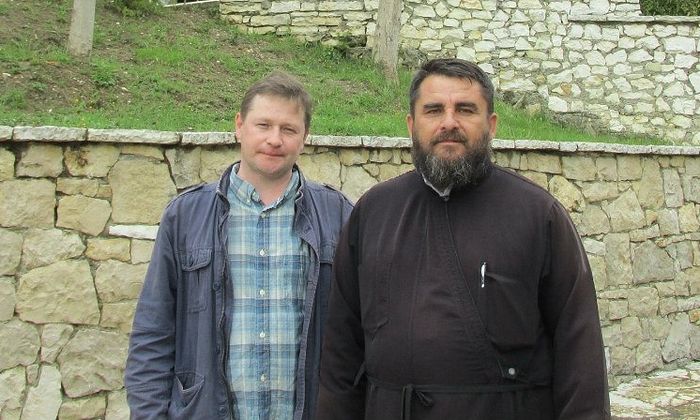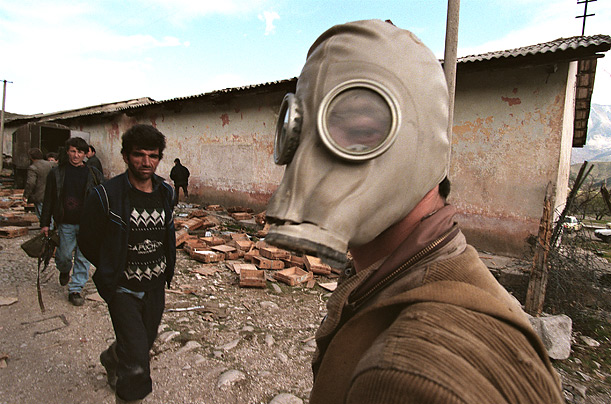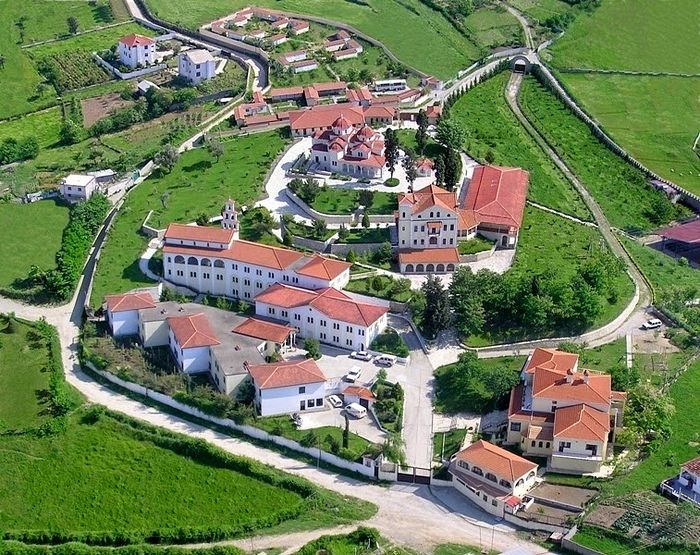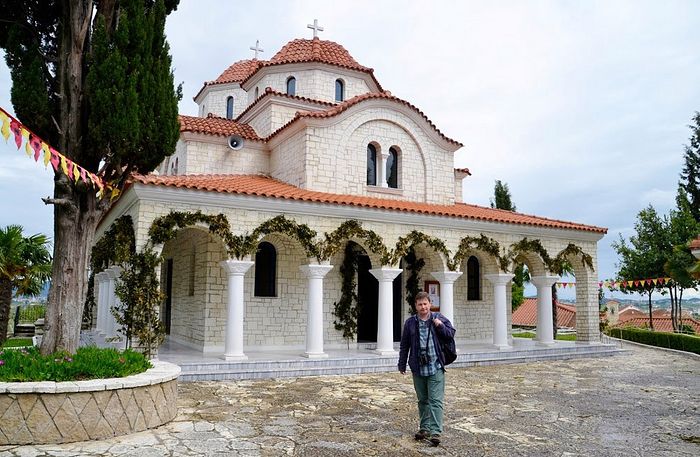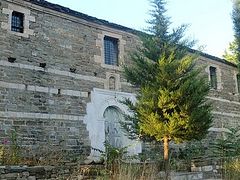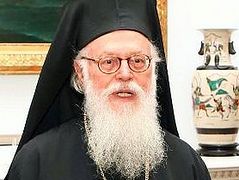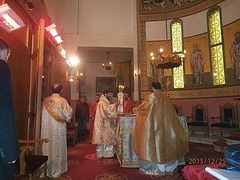The first thing that we saw on our arrival in Durres (the second largest city in Albania) was a man walking a bear on a quay.
I thought to myself, “Down with stereotypes! Bears walking in the street – isn’t that something we’re supposed to see in Russia? Is this really Albania?”
Meanwhile, the huge bear is walking and clacking its teeth with neither a muzzle nor a collar on. His master may as well say to us, “Good morning, dear pilgrims! Our prayer, weakened after fasting, is rapidly gaining a new strength!”
And our response: “Thank you, sir! But, please, go away with your animal as quickly as possible. Or we will make off ourselves, as far from this idyllic scene as quickly as possible…”
The Orthodox Shen Vlash Monastery in honor of St. Blaise is known to everybody in Durres. Restored, it proudly dominates the city, several miles away from the center. These several miles, according to Fr. Nikolaj (Nikolai) Nushi, a monastery priest, by no means prevents residents of Durres, other Albanian towns and other Balkan countries from coming here. “But there are still few Russian people,” Fr. Nikolaj sighs. “Never mind! With the help of God you (Russian people) will learn about this holy place too.”
I did not put the Albanian priest’s surname in parentheses because he is not a monk, but a married priest. “At present there is only one monk here – Bishop Nikolaj! But the monastery exists, prayer is offered up, therefore, I hope monks will come.” We walk peacefully in the monastery courtyard, talking about Orthodoxy in his country as well as outside Albania.
Like others I have interviewed, Fr. Nikolaj vividly remembers the Communist persecutions. He even smiles as I look at him. To me, it is as though he is living history. Maybe young Christians who were born after the Edict of Milan looked at the confessors of old times in the same way, as do today’s great-grandchildren whose ancestors suffered persecutions under Lenin, Stalin and Khrushchev in Russia. And yet, Fr. Nikolaj and I are like real peers in terms of our age, and as brothers in faith.
Priest Nikolaj: I was born in a village into a peasant family. From that terrible time I remember, for example, that we ate meat only once a year – on January 1. This was the law. Each citizen was supposed to receive up to half a kilo of meat, and that’s all. If anybody attempted to produce something on his own, he was prosecuted without delay. I remember the taste of maize with terror; we fed it to pigs that we were to return to the State. I still cannot eat it… by the way, this taste helps me read the Parable of the Prodigal Son (Luke 15:11-32) more attentively. Thus, every cloud has its silver lining, as they say.
But whenever you uttered the very word “God”, persecutions were much more terrible. I also recall how our family along with the whole village used to hide Paschal eggs in the ground so that the “comrades” – the supervisors – might not find them. The village residents kept the old traditions, so we would dye eggs for Pascha (which itself was another prohibited word).
Now we should make efforts to prevent these traditions from remaining self-sufficient; on the contrary, we must show people their meaning and their depth. Otherwise all may be reduced to a mere beautiful yet meaningless ritual. We should necessarily avoid that.
And I passed an exam in scientific atheism with distinction!”
What did you say, Father?
I passed an exam in scientific atheism with distinction. When I was going to enter the Institute, I learned all this Communist nonsense by heart and answered examiners’ questions thus: “As great Lenin / Stalin / Enver Hoxha (the Communist leader of Albania from 1944 to 1985) taught…” – and went on in the same vein, telling the examiners nothing about my personal views which at that time were not mature enough. I was silent on this matter. But, nevertheless, I studied at that Institute and completed it.
And what happened then?
And then Perestroika began, followed by democracy, another thing that could never be mentioned in the night-tide of Communism. Then we had a war in Albania, which ended not long ago. After the fall of the regime of Enver Hoxha we were promised “Western fortune.” But instead, in 1997, pyramid investment schemes appeared, and all the population (almost to a man!) went bankrupt, immensely enriching a handful of persons in charge of privatization.
Such a situation is all too familiar to us as well!
No, our situation was far worse in the end. Our people took up arms and destroyed several military depots. Then the military men who had been transferred to the reserve headed independent detached forces, while the rest of the military became the leaders of government forces. All set out to build genuine democracy together. In a word, everyone warred against everyone. Thousands of people were killed.
A monument called the “Peace Bell” now stands in the center of Tirana. Bullets and cartridges from those awful battles were used to cast this bell. This monument stands in front of Hoxha Mausoleum, though Enver Hoxna was never personally interred there! He was reburied three or four times in total. Then a bar called “Mummy” was opened at the mausoleum and finally all activity at this building dwindled, and the monument was all but abandoned. Soon bands (of refugees) from Kosovo came – that is a particularly horrific story altogether.
Fr. Nikolaj, that is very familiar to us, too. The period of social stagnation, wars, spiritual decline… Only with “the Mummy” the situation is still different, though it is a good example.
Quite so! It was a spiritual vacuum. Only yesterday all was assigned and planned up to grams and minutes, we were equal in our poverty and our fear. But suddenly all changed into utter chaos and terror. Some were killed, some went to fight in the ruined Yugoslavia, others were in a state of melancholy, nostalgia for “the old good times” (my wife’s grandfather still carries Hoxha’s portrait in his pocket and kisses it at every opportunity), and the rest started seeking for Christ. I chose faith in Christ, for which I am so grateful to the Lord Himself and to the Greek Orthodox Church, which at that time undertook its active mission in Albania, including in the sphere of education. Thus I became a priest.
Did many people begin to seek Christ?
Yes. Many began to seek God, to remember Him. Kosovars (Kosovan Albanians) used to tell us that any genuine Albanian must be a Muslim. I believe the Albanian Orthodox Church responded very well to their stupid claims: three of our metropolitans are from Muslim families!
That is a conspicuous fact.
I will not give you their names now; that is not important. But here is the answer to these provocations! The Christian mission is going on and we hope it will bear fruit. But that largely depends on ourselves. Recently I talked with one Serbian priest (from St Blaise’s Monastery)…
Really? I thought that Albanians and Serbs did not communicate with each other!
But we are human beings, after all! And we are Christians. Returning to the fruit of the mission. That Serbian priest said with sadness in his voice, “We Serbs should have preached Christ in Kosovo instead of warring. Had we preached God by the example of our lives and shown Him to people, it would have never led to the mutual hatred and then war.”
I think it concerns not only Serbs.
It concerns all of us. And now we, Orthodox Albanians, are travelling with the mission to Kosovo, meeting with Kosovars and trying to convince them of the fact that Orthodoxy exists for all nations, that Orthodoxy is as natural for Kosovars and Albanians as it is for Serbs and other nationalities, and that if we had been with Christ we would not have been bogged down with all these troubles.
Does it yield good results? Or do you have to face a lack of understanding and accusations of Russophilia and Serbophilia?
With the help of God, there are already some results. But, as we know, a seed that is sown needs time to germinate. And the seeds are sure to germinate, we have absolutely no doubt. Otherwise how can we explain the increasing influx of Christian pilgrims, Muslim visitors and simply “interested” people not only to Albanian monasteries, but also to those in Kosovo and Metohija?
These Albanians, Kosovars and representatives of other nations have overcome or are overcoming the negative, false stereotypes about other peoples and about themselves. Look what remarks Albanians write in the monastery visitors’ books. Maybe they do not reflect a strong faith in Christ, but they do reflect their respect for Orthodoxy. And some of them convert to Orthodox Christianity – they do not make a show of it, but the number of Orthodox faithful is increasing in this land, as it was before. Some are captivated by miracles that occur at Shen Vlash, Visoki Decani and other monasteries (that is true for every holy site). As I have already said, we have not many monks at the moment. But we already have Sister Rachel – the first Albanian nun – who lives at the Skete of the Holy Myrrh-Bearing Women. We do not lose hope, and we understand well that the best preaching is when you fulfil all the Lord’s commandments yourself. If we forget it, then all our efforts are no more than meaningless declarations and empty words and as a result – a total loss.
May God give you strength, Father Nikolaj!
Thank you. I also recommend you to visit the Monastery of St. John Vladimir in Elbasan. Its abbot is a Serb. Give him my compliments.

